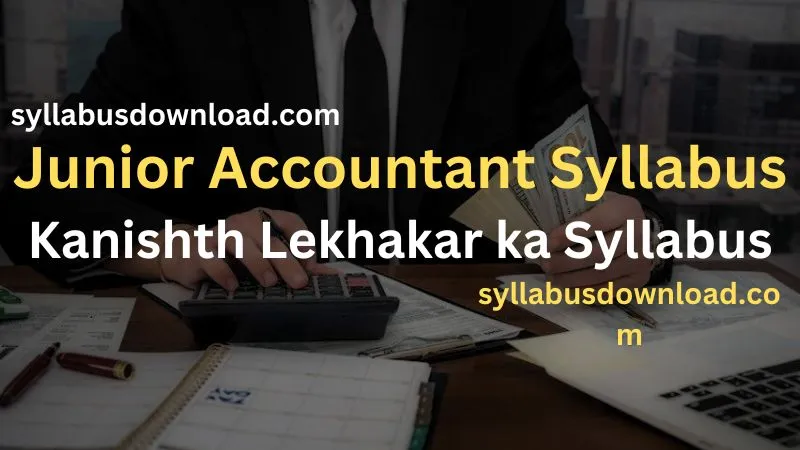If you also are tired of searching for the Kanishth Lekhakar ka Syllabus, then today we are going to give you complete information about Jr Accountant Syllabus here in detail. As you all know, the Junior Accountant Exam Date for Junior Accountant Exam 2023 has been announced by the Rajasthan Staff Selection Commission. According to the issued notification, Junior Accountant Exam Date has been fixed on 17 September 2023.
Contents
- 1 Kanishth Lekhakar ka Syllabus
- 1.1 Rajasthan Kanishth Lekhakar Exam Pattern 2023
- 1.2 Scheme of Examination
- 1.3 RSMSSB Junior Accountant Syllabus 2023
- 1.4 1. Hindi
- 1.5 2. English
- 1.6 4. Everyday Science
- 1.7 5. Mathematics
- 1.8 6. Basics of Computer
- 1.9 RSMSSB Junior Accountant Paper 2 Syllabus
Kanishth Lekhakar ka Syllabus
Would like to tell you that for any exam, the syllabus of that exam is a big key to the success of the exam. So all the candidates are advised that before starting the preparation for Junior Accountant Exam 2023, you should do a thorough study of the syllabus of this exam so that your preparation does not go in the wrong direction. So keeping this problem in mind, we are providing here Kanishth Lekhakar ka Syllabus for you, so that you will be able to improve your preparation.
EMRS Recruitment 2023 Syllabus
However, for your information, would like to tell you that the Rajasthan Staff Selection Commission has not yet released any new Junior Accountant Syllabus in Hindi for this year. But it is being speculated by many big coaching institutes that the Kanishth Lekhakar ka Syllabus is going to remain almost the same as the previous exam. Here we have given you complete information about RSMSSB Junior Accountant Syllabus as well as Rajasthan Junior Accountant Exam Pattern. Keep in mind that the syllabus of Kanishth Lekhakar and Tehsil Rajasva Lekhakar is going to remain the same. Candidates have to read the same syllabus for both posts.
Rajasthan Kanishth Lekhakar Exam Pattern 2023
Scheme of Examination |
||||||
|---|---|---|---|---|---|---|
| Paper | Subject | Maximum Marks | Questions | Time | ||
| I | Hindi | 75 | 25 | 2.30 Hours (150 Minutes) | ||
| English | 75 | 25 | ||||
| General Knowledge (Related to Rajasthan) | 75 | 25 | ||||
| Daily Science | 75 | 25 | ||||
| Maths | 75 | 25 | ||||
| Computer Fundamentals | 75 | 25 | ||||
| Total | 450 | 150 | ||||
| Note: | Fundamentals of Mathematics and Computer will be of Secondary Level (10th Level), rest of the question paper will be of Senior Secondary Level (12th Level). | |||||
| II | 2.30 Hours (150 Minutes) | |||||
| 75 | 25 | ||||
| 2. Business Model | 75 | 25 | ||||
| 3. Audit | 75 | 25 | ||||
| 4. Indian Economics | 75 | 25 | ||||
| 5. Rajasthan Service Rules Volume 1 (Chapters 2, 3, 10, 11, 13, 14, 15 and 16) Rajasthan Civil Service Joining Times Rules, 1981 | 75 | 25 | ||||
| 6. General Financial and Accounts Rules Volume 1 (Chapters 1, 2, 3, 4, 5, 6, 14, and 17) | 75 | 25 | ||||
| Total | 450 | 150 | ||||
| Note: | Except for the subjects mentioned under serial numbers 5 and 6, the rest of the paper will be of graduation level. | |||||
Note:
- Each question paper will have 150 multiple-choice questions, and all questions will be of equal marks.
- There will be ⅓ negative marking for each wrong answer during evaluation.

RSMSSB Junior Accountant Syllabus 2023
1. Hindi
- Sandhi and Sandhi Viched
- Composition of Samasik Words and Samas Vigraha.
- Prefix
- Suffix
- Synonym words
- Antonyms
- Double-meaning (Anekarthi) words
- Word Combinations
- Making adjectives from nouns
- Word-Shuddhi: Purification of impure words and the cause of word impurity
- Sentence-correction: purification of impure sentences and the reason for the syntactic inaccuracy
- Vachya – Kartrivachaya, Karmacharya, and Bhavachya experiment.
- Verb: Transitive, intransitive and modal use.
- A meaningful word for the phrase.
- Idioms and Proverbs.
- Hindi words equivalent to technical (technical) words in English
- Conversion of simple compound and compound English sentences into Hindi and conversion of Hindi sentences into English
- Knowledge related to official letters
2. English
- Tenses/Sequence of Tenses.
- Voice: Active and Passive.
- Narration: Direct and Indirect.
- Transformation of Sentences: Assertive to Negative, Interrogative, Exclamatory, and vice-versa. ∙ Use of Articles and Determiners.
- Use of Prepositions.
- Translation of Simple (Ordinary/Common) Sentences from Hindi to English and vice-versa. ∙ Correction of sentences including subject, Verb, Agreement, Degrees of Adjectives, Connectives, and words wrongly used.
- Glossary of official, Technical Terms (with their Hindi Versions).
- Synonyms.
- Antonyms.
- One-word substitution.
- Forming new words by using prefixes and suffixes.
- Confusable words.
- Comprehension of a given passage.
- Knowledge of writing letters: Official, Demi Official, Circulars and Notices, Tenders.
3. General Knowledge (Related to Rajasthan)
History, Art, Culture, Literature, Tradition, and Heritage of Rajasthan
- Important historical events in the history of Rajasthan, major dynasties, and their administrative and revenue system. socio-cultural issues
- Freedom movement, public awareness, and political integration.
- Main features of architecture – forts and monuments.
- Arts, paintings, and handicrafts.
- Important works of Rajasthani literature, regional dialects.
- Fairs, festivals, folk music, and folk dances.
- Rajasthani culture, tradition, and heritage.
- Religious movements, saints, and folk deities of Rajasthan.
- Important tourist destination.
- The prominent personality of Rajasthan.
Geography Of Rajasthan
- Major physical features and major geophysical divisions.
- Natural resources of Rajasthan.
- Climate, Natural Vegetation, Forest, Wildlife and Biodiversity
- Major irrigation projects.
- Mines and mineral resources.
- population.
- Major industries and possibilities of industrial development.
The political and administrative system of Rajasthan
- Governor, Chief Minister, State Legislative Assembly, High Court, Rajasthan Public Service Commission, District Administration, State Human Rights Commission, Lokayukta, State Election Commission, State Information Commission
- Public Policy, Legal Rights, and Citizen’s Charter
Economy of Rajasthan
- Marco’s view of the economy
- Major issues of agriculture, industry, and service sector
- Growth, Development, and Planning
- Infrastructure and resources
- Major Development projects
Current Events
- Major Contemporary events and issues of Rajasthan state level, national and international importance
- Current Famous People and Places
- Sports and sports-related activities
4. Everyday Science
- Physical and chemical reactions, oxidation and reduction reactions, metals and non-metals. Hydrocarbons, Chloro-Fluoro Carbon (CFC), Compressed Natural Gas (CNG), Soap and Detergent Pesticides, Reflection of light and its laws, examples of refraction, types of Lenses, Defects of vision and their corrections.
- Electric current, Unit of electric current, Electric cell, Electric generator, Electric connection· arrangement in houses. Working on household electrical appliances. Uses of space science, Remote Sensing Technique, and its uses. Information Technology.
- Environment – Components (Atmosphere, Lithosphere, and Hydrosphere), Ecosystem-structure. Foodchain, Food-web, Nitrogen cycle. General information about – Bio-technology, Bio-patents, Stem cells,· Cloning, Test Tube Baby, and Artificial insemination.
- Apiculture, Seri-culture, Fishery, Poultry, Dairy industry, Cereals, Pulses, Vegetables, Fruits, Medicinal· plants. Blood group, Blood transfusion, Rh factor, Pollution and human health, pathogens and human health, Intoxicant and human health, Mal-nutrition, and human health.
- Immunity, Vaccination, Types of diseases, Hereditary diseases – Haemophilia Colour blindness,· Thalassemia, National Health Programme, Manures – Bio-manure, Wormy compost.Crop rotation, Plant disease control.
5. Mathematics
- Natural numbers, rational and irrational numbers, and their decimal expansions, operations on real numbers, laws of exponents for real numbers, rational numbers, and their decimal expansions.
- Ratio and proportion, percentage, Profit and loss, simple and compound interest, time and distance, time· and speed, work, and time.
- Collection of data, presentation of data, graphical representation of data, a measure of central tendency,· mean, mode, and median of ungrouped & grouped data.
6. Basics of Computer
- Introduction to Computer & Windows: Input/Output Devices, Memory, PORTs, Windows Explorer Menu, Managing Files & Folders, Setup & Accessories, Formatting, Creating CD/DVD.
- Word Processing· & Presentations: Menu Bars, Managing Documents & Presentations, Text Formatting, Table Manipulations, Slide Designs, Animations, Page Layout, Printing.
- Spread Sheets: Excel Menu Bar, Entering Data, Basic Formulae· & Inbuilt Functions, Cell & Text Formatting, Navigating, Charts, Page Setup, Printing, Spread Sheets for Accounting.
- Working with the Internet and e-mails: Web Browsing· & Searching, Downloading & Uploading, Managing an E-mail Account, e-Banking.
RSMSSB Junior Accountant Paper 2 Syllabus
Paper -2 Syllabus
-
BOOK-KEEPING AND ACCOUNTANCY
- Accounting – meaning, nature, functions, and usefulness, types of accounting, accounting equation, generally accepted accounting principles, concepts, and conventions.
- Accounting process: journals and ledger leading to the preparation of trial balance and preparation of final accounts with adjustments.
- Preparation of bank reconciliation statement.
- Rectification of errors.
- Accounting for depreciation – need, significance, and methods of providing depreciation.
- Receipts and payments account and income and expenditure account and balance sheet.
- Single entry system – Preparation of accounts from incomplete records.
- Partnership accounts : (i) Fundamentals – capital-fixed and fluctuating, adjustments for change in profit sharing ratios, revaluation of assets, and treatment of goodwill. (ii) Reconstitution of the firm – Admission, Retirement, and Death of a partner including treatment of life policy.
- Insurance claims.
II. BUSINESS METHODS
- Business:- Introduction, scope, and objectives; Business Ethics and social responsibilities of business.
- Forms of Business Organisations:- Sole proprietorship, partnership, and company.
- Entrepreneurship:- Concept, importance, and Causes of Low Development of Entrepreneurship in India
- Negotiable Instruments:- Meaning and types (Promissory Notes, Bills of Exchange, and Cheques).
- Sources of Business Finance.
- Advertising:- Meaning, importance, and methods.
- Consumer rights and protection against exploitation.
- Human resource planning, recruitment, selection, and training.
- Communication – process, barriers, and suggestions to overcome barriers.
- Discipline – Causes and suggestions for effective discipline.
- Coordination – Importance and principles
III. AUDITING
- Auditing: meaning, objectives, types of audit, planning, and procedures, audit program, working papers, test checking, routine checking.
- Vouching: concepts, importance, and procedures.
- Internal Control: meaning, objectives, internal check, and internal audit.
- Valuation and verification of assets and liabilities.
- Rights, Duties, and Liabilities of Company Auditor.
- Audit of Government Companies.
- Audit Reports and Audit Certificates
IV. INDIAN ECONOMICS
- Indian Economy – Features and problems, Economic policy, Industrial policy and Fiscal policy of India.
- Meaning, objectives, and importance of economic planning in India. Basic features of Eleventh Five Year Plan.
- Population Explosion–Causes, effects, and Remedies. Relation between population and economic growth.
- Role and significance of agriculture in the Indian economy. Sources of agriculture finance and recent trends in agriculture marketing.
- Industrial growth and prospects in India.
- Inflation – Causes, effects, and remedies.
- Role and problems of Public sector in India.
- Impact of globalization and liberalization on agriculture and industry.
- Role of Multi-national corporations in the Indian economy.
- Foreign Trade – Volume, composition, and direction.
- National Income – Concept, computation methods, and distribution.
- The economy of Rajasthan – Basic features, development, and prospects of agriculture, industry, and tourism.
V. Rajasthan Service Rules Vol. 1 (Chapter II, III, X, XI, XIII, XIV, XV & XVI) Rajasthan Civil Service Joining Times Rules, 1981
VI. G.F. & A.R. – Pt. I (Chapters 1, 2, 3, 4, 5, 6, 14, and 17)
Note: The question paper will be of graduation level, except for the subjects mentioned at serial numbers V and VI.

Hey everyone, I’m Satish, and I’m a student preparing for various government exams. I created this webiste to let you all know the upcoming exam syllabus and help you prepare well for your exams.
